Key takeaways:
- Classic genres like rock, blues, jazz, and metal have shaped contemporary music and cultural movements, eliciting strong emotions and nostalgia among listeners.
- Metal music, emerging in the late 1960s and early 1970s, is characterized by its diverse subgenres and exploration of complex themes, inviting emotional reflection.
- Nostalgia plays a crucial role in reviving classic genres, as social media and streaming platforms facilitate discovery of both iconic and emerging bands that echo past sounds.
- Modern bands are creatively blending traditional metal elements with contemporary styles, ensuring that classic influences evolve while resonating with new generations.

Definition of classic genres
Classic genres in music typically refer to styles that have stood the test of time, encapsulating qualities and characteristics that resonate across generations. Think of rock, blues, jazz, and classical – these genres not only laid the foundation for contemporary music but also influenced countless artists and subgenres.
When I think about classic genres, I often get transported back to the first time I heard a Led Zeppelin riff or a passionate blues solo. It’s fascinating how these styles evoke strong emotions and memories. Have you ever felt the energy of a classic rock anthem? For me, it’s that rush of nostalgia mixed with excitement every time I hear those iconic chords.
Moreover, classic genres are defined by their cultural significance and the way they shaped societal movements. For instance, the blues emerged from African American communities, telling stories of hardship and resilience. Isn’t it remarkable how music can serve as a mirror to society’s challenges and triumphs? It makes me appreciate the depth and layers that classic genres bring to the musical landscape.
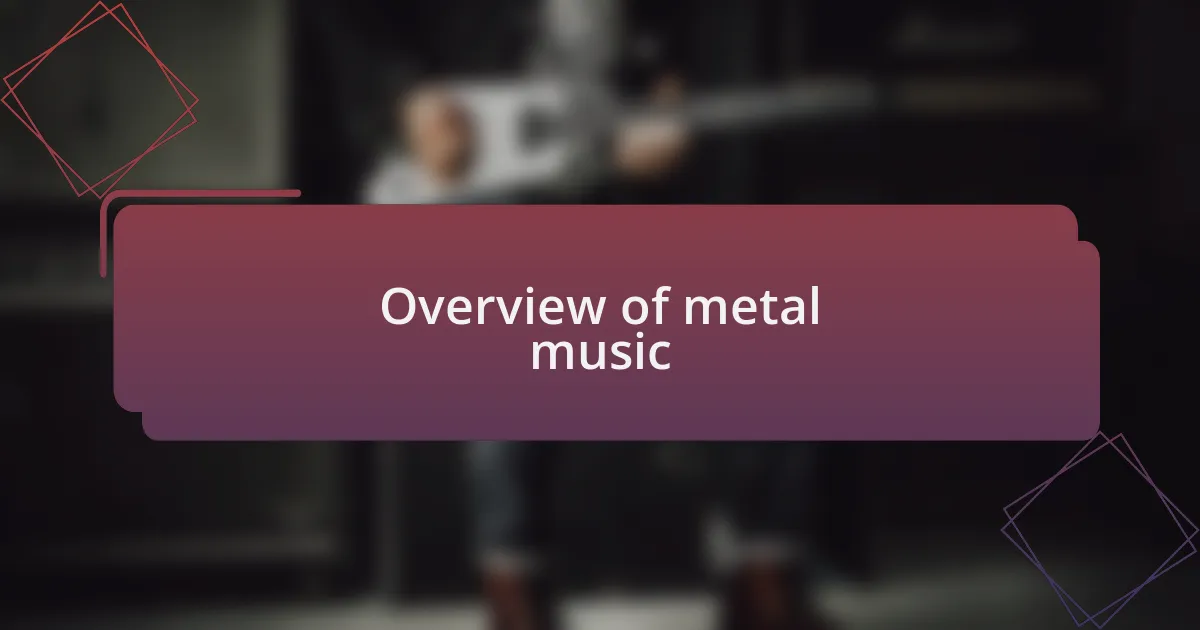
Overview of metal music
Metal music is a powerful genre that emerged in the late 1960s and early 1970s, blending blues-rock roots with heavier guitar riffs and aggressive tones. Bands like Black Sabbath and Deep Purple pioneered this sound, infusing their music with dark themes and theatrical elements. When I first heard “Iron Man,” I couldn’t shake the adrenaline coursing through me—it’s a visceral experience that resonates deeply with fans.
One of the defining characteristics of metal is its diversity. From thrash and death metal to symphonic and doom, each subgenre carries its own unique flavor while sharing the core ethos of metal. I remember attending a metal festival where I was exposed to various styles. The raw energy of a thrash set followed by an orchestral arrangement blew my mind. Have you ever felt that contrast, where the music takes you on a journey through emotions you didn’t even know existed?
Metal also often grapples with complex themes—identity, struggle, and societal issues—making it a genre that invites deep reflection. As I delve into lyrics from bands like Slipknot or Metallica, I’m struck by their ability to channel pain and resistance. It’s that blend of raw energy and thought-provoking content that makes metal not just music, but a form of emotional liberation. How has metal music shaped your view of life’s challenges? For me, it’s an ever-evolving journey that continually resonates on a personal level.
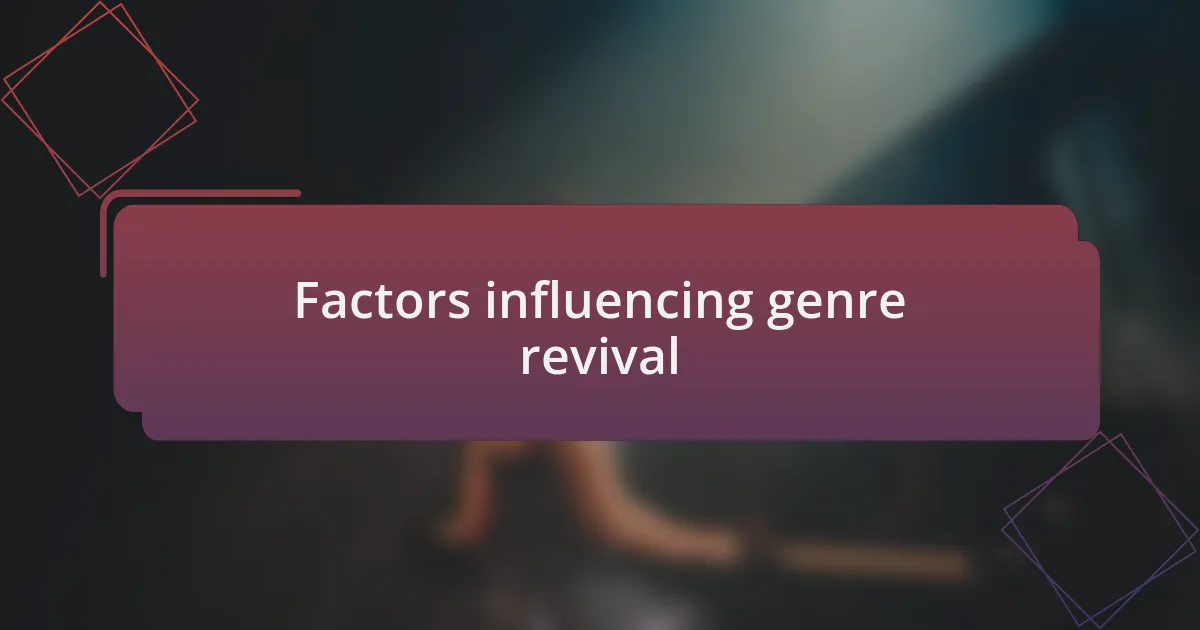
Factors influencing genre revival
One of the key factors driving the revival of classic genres, including metal, is nostalgia. Bands and fans alike often reflect on their formative years, recalling the thrilling nights spent at venues where the music electrified their senses. I remember revisiting old albums from the ’80s; the sounds took me back, stirring memories of my youth and igniting a desire to relive those euphoric moments through newer acts that capture that same spirit. Can you think of a moment when a song transported you back to a different time in your life?
Moreover, social media and streaming platforms have changed the landscape of music consumption. With just a few clicks, listeners can discover classic metal tracks and emerging bands that embody those vintage sounds. I’ve found myself lost in playlists filled with both iconic and underground metal, reflecting a unique blend of old and new. Have you noticed how easy it is to stumble upon hidden gems from the past that resonate with the present?
Lastly, the influence of younger musicians who actively reference their metal forebears cannot be underestimated. They often cite classic bands as inspirations, blending traditional elements with modern sounds. I recently caught a new band live that seamlessly integrated elements of classic metal with fresh riffs—watching the crowd’s reaction told me that we’re all hungry for that connection to our roots. How do you feel when you hear a new band honoring the legacy of classic metal?
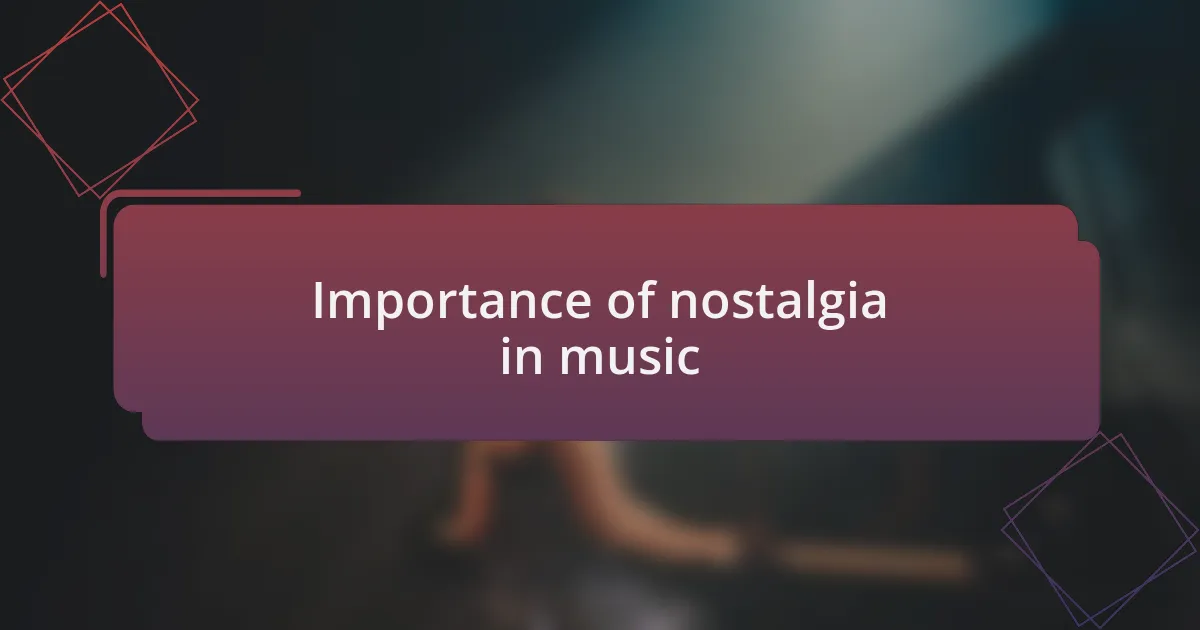
Importance of nostalgia in music
Nostalgia in music is a powerful force that often evokes deep emotional responses, creating a sense of belonging among listeners. I vividly remember the first time I heard a classic album—every riff and lyric felt like an old friend greeting me after years apart. It struck me how these familiar sounds could stir emotions, often making me reflect on important moments in my life. Have you ever felt that rush of memories when a particular song comes on?
For many, revisiting the music of the past serves as a comforting escape from the chaos of modern life. There’s something profoundly satisfying about losing yourself in the gritty guitar solos and raw lyrics that defined an era. I find that newer bands who tap into these classic sounds can transport me back to simpler times, reminding me of moments shared with friends at concerts or late-night jam sessions. What about you? Do you find solace in the music that shaped your youth?
Additionally, nostalgia fuels creativity, pushing artists to reinvent classic sounds in a contemporary context. I’ve seen bands successfully blend vintage metal with innovative styles, creating a refreshing yet familiar experience. This inventive homage builds a bridge between generations, allowing both older fans and new listeners to share in the excitement of these revived genres. Isn’t it fascinating how nostalgia not only preserves the past but also inspires the future of music?
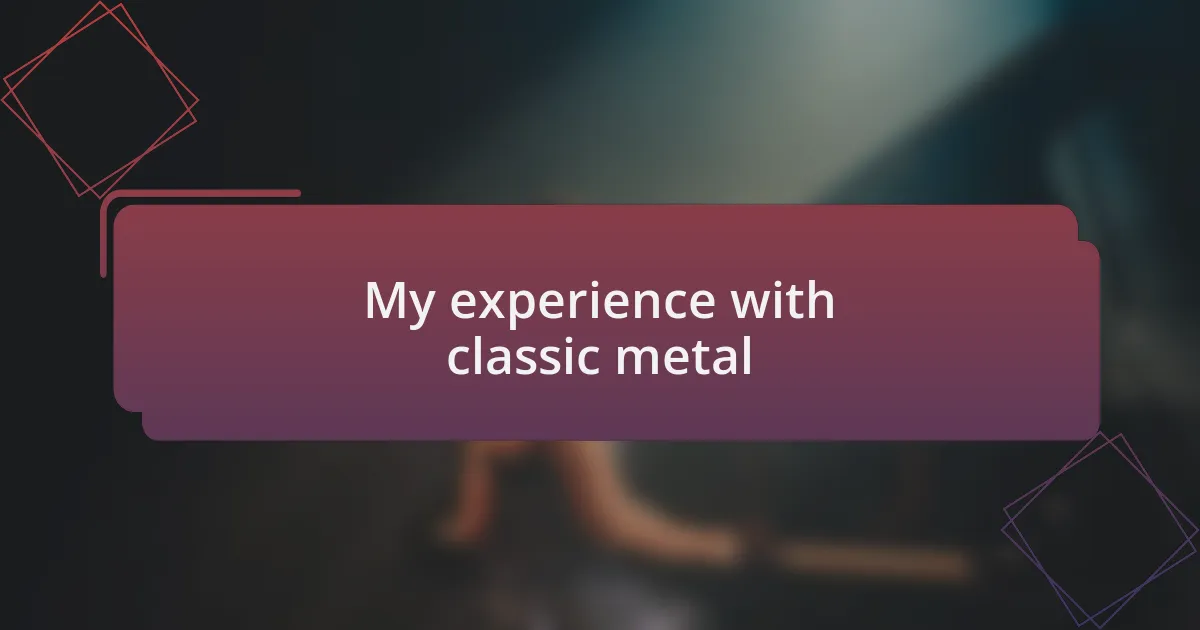
My experience with classic metal
Classic metal has been a significant part of my life, filling my teenage years with unforgettable moments. I can still picture myself in my friend’s dimly lit basement, the speakers thumping with the powerful riffs of legends like Iron Maiden and Black Sabbath. It was more than just music; it was an awakening, a sense of belonging to something larger than myself.
There was a particular night that stands out in my memory. The first time I saw a classic metal tribute band, the atmosphere was electric. As they played those iconic solos, the crowd erupted in cheers, and for a few hours, we all became part of something timeless. Wasn’t it incredible to experience firsthand how those old songs could ignite such passion in a room full of strangers?
As I listen to classic metal today, I often find myself reminiscing about those vibrant days of youth. It’s not just about the music; it’s about the connections formed through shared love for the genre. When I hear a classic track, I can almost smell the popcorn from the local movie theater where we’d gather afterward, debating which band had the best album. Don’t you ever get lost in those memories, too?
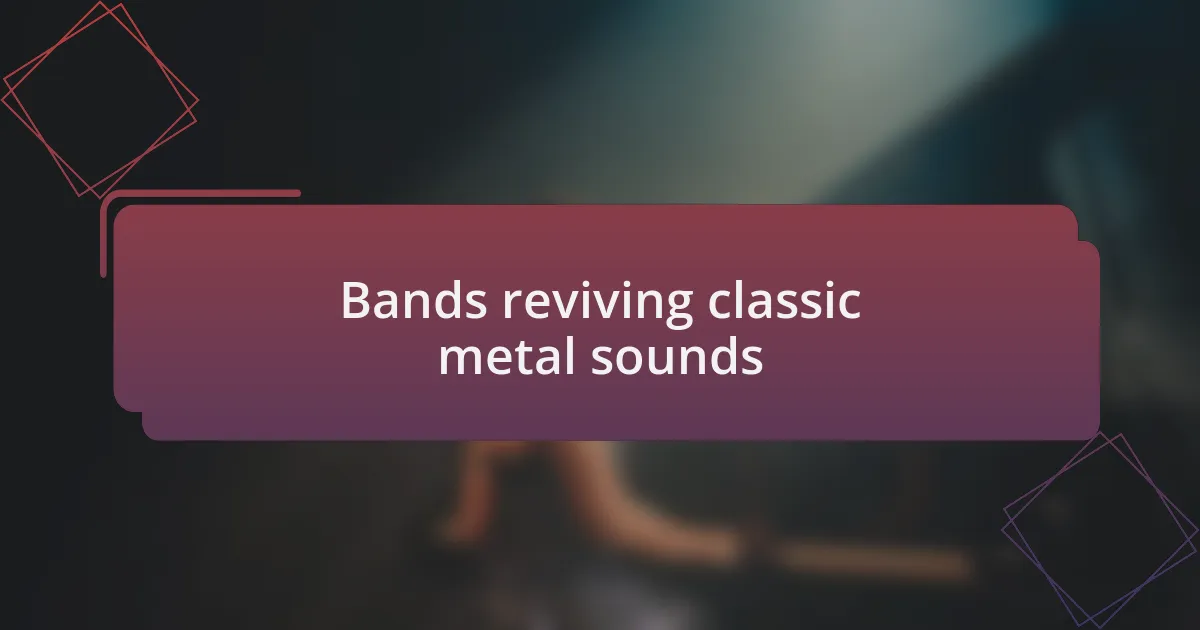
Bands reviving classic metal sounds
There’s something truly exciting about bands today who are channeling the raw energy and distinctive sound of classic metal. For instance, I stumbled upon a newer group that draws heavily from the early Iron Maiden and Judas Priest vibes. The way they weave intricate guitar solos into their music really reminded me of the classics I grew up with. It sparked that familiar rush of nostalgia—don’t you think it’s remarkable how modern bands can capture that essence?
Take for example the recent surge of power metal bands reviving the bombastic storytelling and epic melodies that characterized the genre’s golden age. I remember attending a festival where one such band performed, and the crowd felt electric as they executed harmonies reminiscent of the genre’s early pioneers. It got me thinking: how can new generations of metal fans embrace such powerful sounds from the past while creating their own identities?
Another fascinating aspect is how these bands are not merely copying their predecessors but innovatively integrating modern elements into classic frameworks. Just a few months ago, I came across a band blending thrash metal with symphonic orchestration. Hearing those layered arrangements live felt like a conversation between the past and present. I can’t help but wonder how this hybrid approach will shape the future of metal. Isn’t it thrilling to consider what classic genres can evolve into when infused with fresh creativity?